Pneumatic Transport and Injection
Arcon supplies low energy, low maintenance and environmentally enhanced materials handling solutions for customers in process-based manufacturing environments such as iron and steel.
PNEUMATIC INJECTION
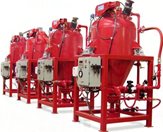 |
Arcon has provided pneumatic injection solutions across many industries and has consistently improved productivity rates, system reliability, availability and performance for our clients. |
ADVANTAGES OF PNEUMATIC INJECTION
|
-
Increased Process Control
-
Increased Injection Accuracy
-
Increased Productivity
-
Increased Reliability
-
Increased Utilisation of Raw Material
|
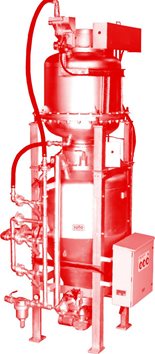 |
The core technology utilised for the accurate, adaptable and reliable injection of material is called the Rotofeed. The Rotofeed is generally used for finer, granular and powdered materials which cannot be accurately handled with a screw. Such materials include pulverised coal and copper concentrate.
The RotoFeed range is designed to effectively inject solid materials into processes, either continuously or on a batch basis, to one or multiple points. This system injects materials with accuracies of 2% by volume or 0,5% by weight, depending on the control method employed - volumetric or weigh related respectively. Containment backpressures of up to 50 barg can be accommodated by the Rotofeed, and injection distances are only limited by the available conveying pressure.
The RotoFeed system has been widely used in the steel and pig-iron industries, in order to continuously inject coal into their blast furnaces, reducing the requirement of coke, and allowing fines to be injected straight into the blast furnace. Injection rates usually average at 185 kg/ton of hot metal, although some operations have injected up to 210 kg/ton.
|
The Rotofeed is shown in the animation and consists of a rotor mounted on a vertical shaft within a casing. Material passes from the dispensing vessel into the feeder. As the feeder rotates the material is transferred to the outlet where it is entrained in the injection gas flow and passes through the pipeline to the process.
PNEUMATIC CONVEYING

Dense Phase Pneumatic Conveying technology is suitable for transporting difficult, abrasive and/or friable materials, and conveying material along a pipe in plug form at very low velocities. This results in minimal wear on pipes and bends, promoting minimum maintenance and long life. Efficient use of compressed air also gives low power consumption and running costs.
The range of Dense Phase Pneumatic Conveying systems have been designed to provide a simple and effective method of transferring material from a single collection point to either single or multiple reception points, and can be used throughout the iron and steelmaking industries to transfer almost all types of bulk solid materials. Systems are available for materials at temperatures up to 450°C, rates of over 300 tonnes/hour, and for distances up to 1.5 miles, all in a single pipeline.
ADVANTAGES OF DENSE PHASE PNEUMATIC CONVEYING
|
-
Lower Energy
-
Lower Maintenance Costs
-
Lower Operational Costs
-
Increased Productivity
-
Increased Reliability
-
Reduced Risk of Material Spillage
-
Reduced System Footprint
-
Flexibility to Extend Application
|
BLAST FURNACE COAL INJECTION
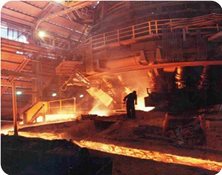 |
Today coal injection is an accepted and well-recognised practice to reduce reliance on metallurgical coke and reduce ironmaking costs.
Twenty-five years ago Clyde Materials Handling and Corus (formerly British Steel) pioneered the development of advanced coal injection into blast furnaces using Granular coal instead of the more traditional Pulverised coal.
|
ADVANTAGES OF GRANULAR COAL INJECTION (GCI)
|
-
Reduced grinding costs
-
Reduced drying costs
-
Cheaper operating costs
|
Together with Arcon, Clyde Materials Handling and Corus now jointly promote blast furnace coal injection to other steelmakers all over the world.
Clyde Materials Handling are the only company to be able to offer traditional Pulverised coal injection systems as well as the more advanced Granular coal injection systems.
The other major advantage of the systems is the advanced injection technology used. Clyde Materials Handling has developed the most advanced Rotofeed and Rotoscrew injection technologies that enable a wide range of materials to be handled by the same piece of equipment. These materials include Pulverised coal, Granular coal, illmenite, plastics, iron ore fines and any other dusts that are required to be injected into the furnace.
It also enables high injection rate accuracy and tuyere to tuyere accuracy to be achieved, of +/-1% measured on a second to second basis. This level of accuracy is vital for good coal distribution around the furnace and for injection rates over 150 kg/thm.
DESULPHURISATION AND CASTING
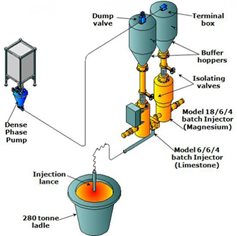 |
Desulphurisation offers increased product quality by introducing additives to liquid metals. Enhanced casting operation is then possible by delivery of flux to the casting table.
Additives to desulphurise and enhance the quality of liquid metal can also be supplied. Accurately injecting additives such as magnesium and limestone directly into hot metal ladles, systems can be fully integrated into plants. The result is improved quality and casting performance without delaying production or major changes to plant layout.
|
ALTERNATIVE IRON MAKING
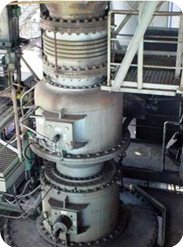 |
Clyde Materials Handling has transferred its technologies into the field of alternative iron making. Today, they work with a number of recognised industry leaders including VAI, POSCO and HIsmelt. For each, raw materials feed systems have been provided that combine accuracy and reliability to help in the stable production of consistently high quality metal. Arcon supplies these systems that handle coal, ferrous fines, limestone, ore and additives.
|
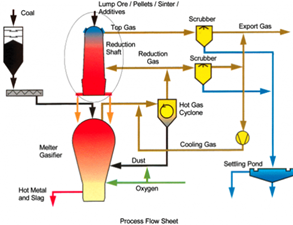
CONTINUOUS CASTING FLUX INJECTION
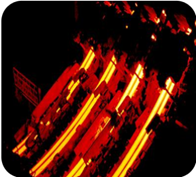 |
Developed to improve the continuous casting process, the flux injection system can be used to boost metal quality, smooth production and reduce costs. The system takes flux materials from a storage container and delivers it consistently and reliably to the casting table. This creates a stable level of flux above the molten steel and reduces breakouts, snagging and flux entrainment in metal. In turn this reduces the need to repair surface finish and reduces waste flux. |
OFF-GAS DUST TRANSFER
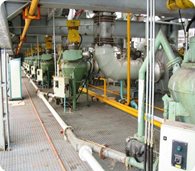 |
Hot and abrasive dust from gas cleaning plants can present a real challenge to traditional mechanical conveyors. Pneumatic conveying offers a reliable alternative that is both economical to operate and completely enclosed. |